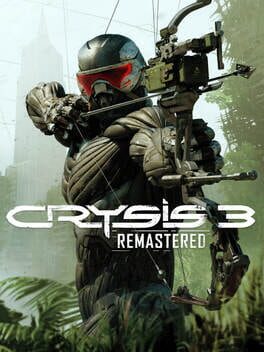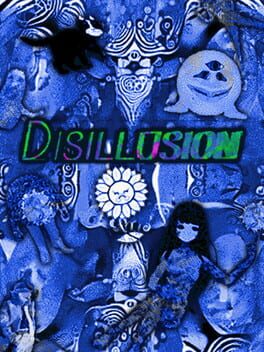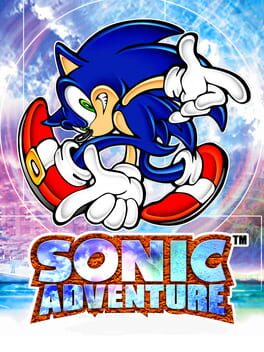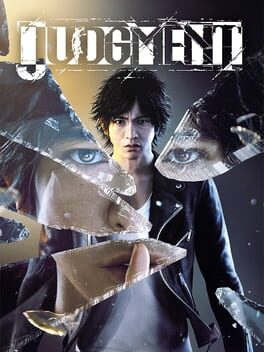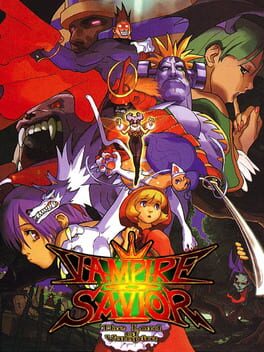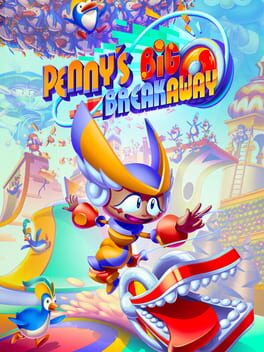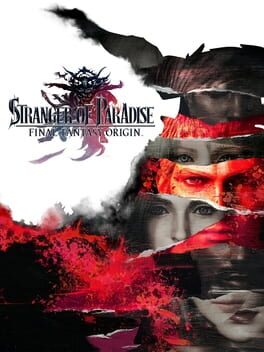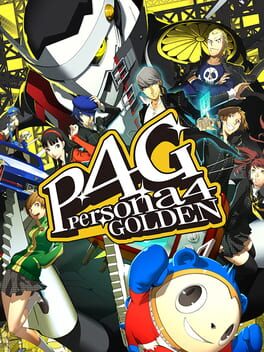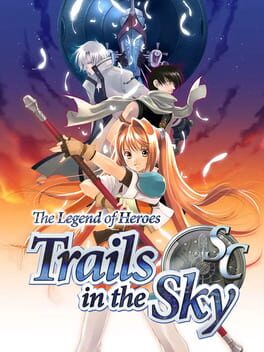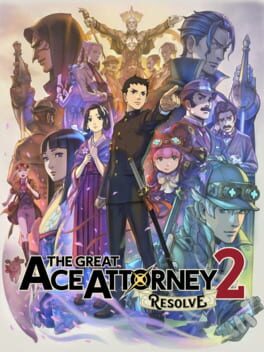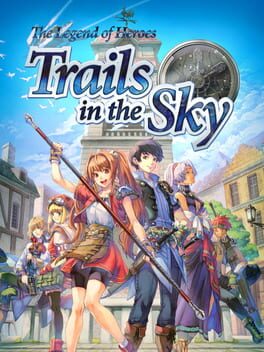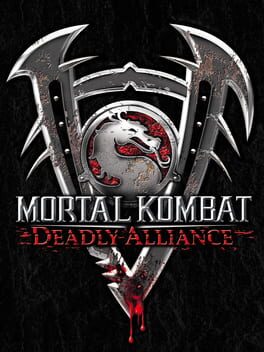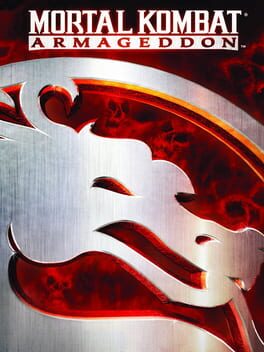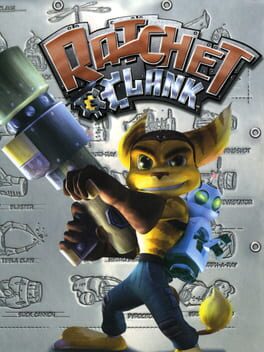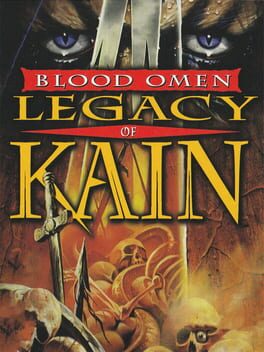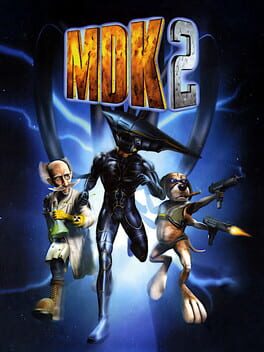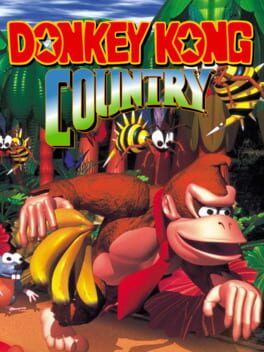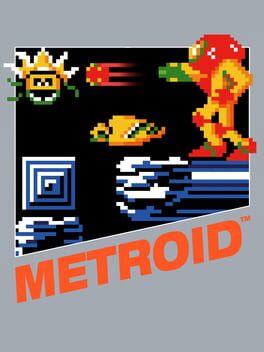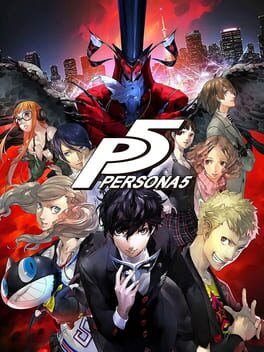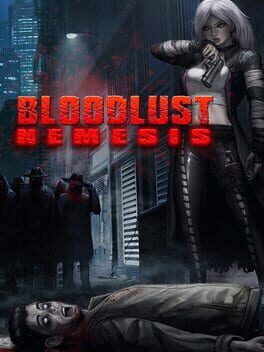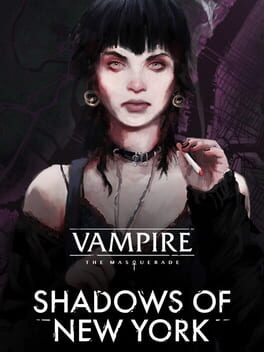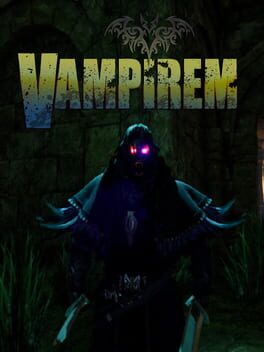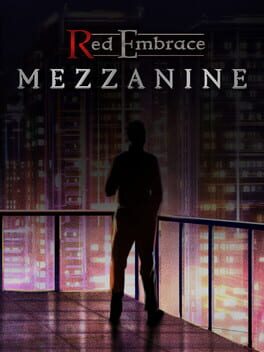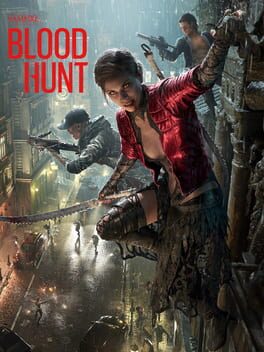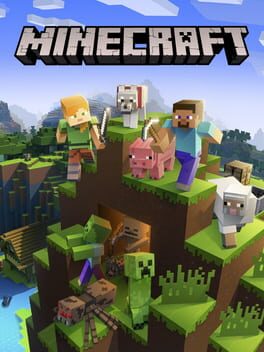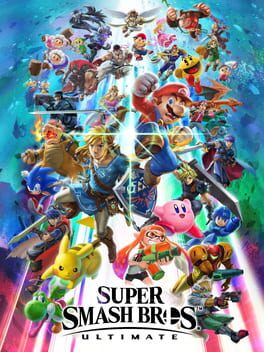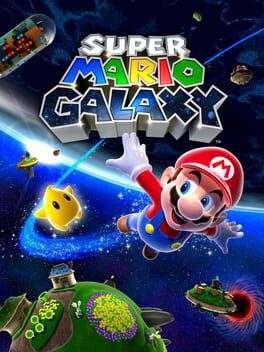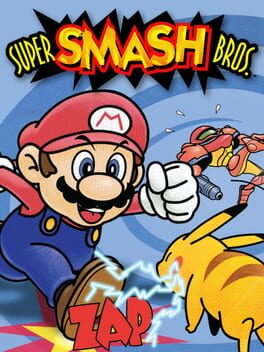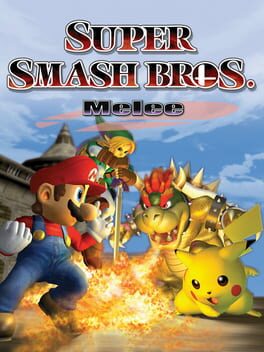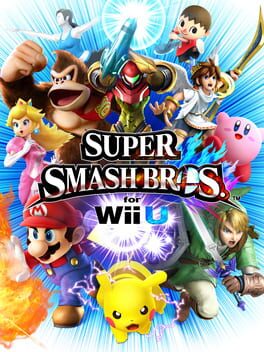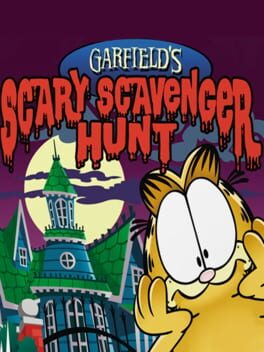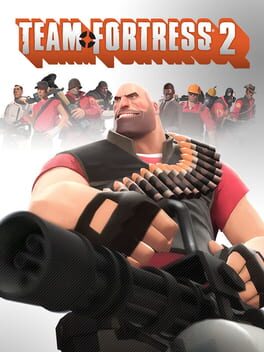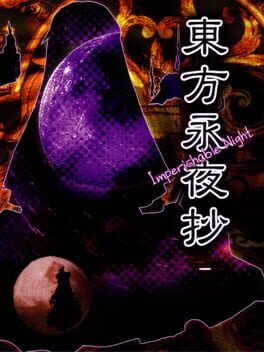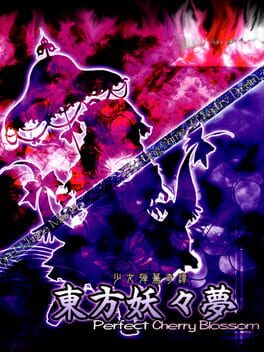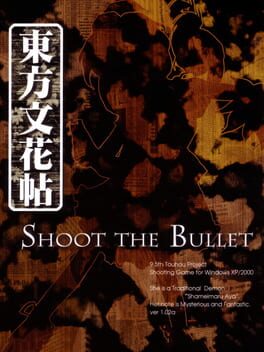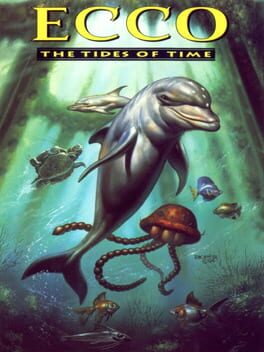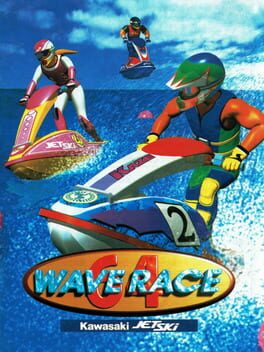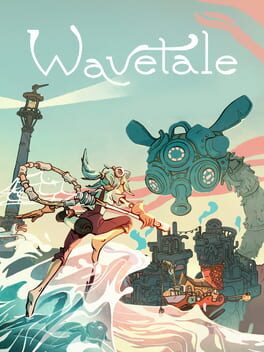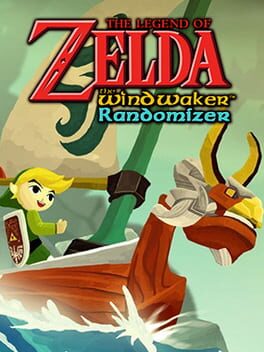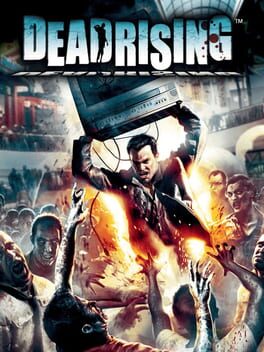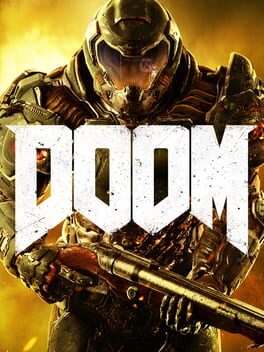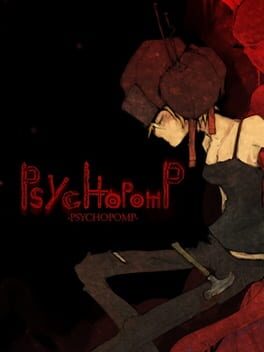FallenGrace
BACKER
9664 reviews liked by FallenGrace
Crysis 3 Remastered
2021
Despite the negative backlash Crysis 3 had at launch, this was the Crysis where i've had the most fun playing.
I really felt like in a Predator movie, hunting poor bastards with my bow while being invisible.
Crysis 3 for me was like a 'best of' Crysis. The stealth felt like the best approach for me, and i fun while doing so.
What this game could have needed was a few extra levels, I found it rather short.
And just like the other Crysis games, Crysis 3 is no exception when it comes to looking good.
Im not sure what to expect from Crysis 4 but let's hope it will be good.
I really felt like in a Predator movie, hunting poor bastards with my bow while being invisible.
Crysis 3 for me was like a 'best of' Crysis. The stealth felt like the best approach for me, and i fun while doing so.
What this game could have needed was a few extra levels, I found it rather short.
And just like the other Crysis games, Crysis 3 is no exception when it comes to looking good.
Im not sure what to expect from Crysis 4 but let's hope it will be good.
Disillusion
2021
The real disillusion is the combat here.
A while ago, I found out about Disillusion in some youtube video and the game looked very intriguing with its bizarre art direction and strange vibe, so I wanted to play it in the near future. Considering this is an indie game that's about 3€ and won't go on sale anytime soon, I just decided to snag it recently and check it out (since I had nothing else I wanted to play at the time).
I'll give credit where it's due, the intended atmosphere is well done and the exploration was also exciting for most of the time: you navigate through the tower in a first-person dungeon crawler perspective, while stumbling upon various weird creatures and portals leading you to other places. Some of these places are a classroom, a shrine or even some... jumbled mess. It's fun to explore those areas, since they have a surreal feel to them I can't really put into words, even if there's not much gameplay here. I mean, there is gameplay with the combat, but it's not good. Sometimes an enemy blocks the way and you can't pass through, so you need to resort to the most basic and barebones RPG Maker combat out there to fend them off. While many people don't like OMORI's combat, atleast that game tried for an unique approach (which I personally liked too). With a plethora of useless skills and needlessly spongy enemies, the normally fun exploration comes to a screeching halt and you'll just engage in this really boring combat for a large amount of your playtime. I know the game is a walking simulator for the most part, so why even include fights in the first place? I'm sure me and many others are playing it just to run around those strange settings and not to fight monsters, which are all copy pasted and use the same three attacks anyways. The worst part is really dying to some random crit and having to do entire areas over again if you forgot to save, but to be fair, you're warned early on to save often. You get the gist.
Surprisingly, unlike games like Yume Nikki, Disillusion actually has a story, dealing with themes like rebirth and eternal damnation. It's not a central focus, as you only get vague hints spoonfed through your companion Mel and you're expected to piece together the remaining pieces for yourself. Speaking of Mel, she's pretty cool and probably one of the main reasons I didn't drop this game earlier, her banter at times is nice even if it's nothing special by writing standards. There's... not much else to be said about her, except that she's green and also plays a bigger role in the overarching narrative.
Alright, so Disillusion is a decent game, but I just can't get myself to finish it, knowing that it's going to mess with my PC's resolution again (for some reason it breaks windowed applications like Discord and you need to resize them anytime after going into this game's fullscreen mode) and I'd have to go through more arduous random encounters. Despite this, I'd still recommend it for the most part for anyone interested, as the exploration aspect is rather intriguing and you can get a few hours of content for the low price of 3€.
A while ago, I found out about Disillusion in some youtube video and the game looked very intriguing with its bizarre art direction and strange vibe, so I wanted to play it in the near future. Considering this is an indie game that's about 3€ and won't go on sale anytime soon, I just decided to snag it recently and check it out (since I had nothing else I wanted to play at the time).
I'll give credit where it's due, the intended atmosphere is well done and the exploration was also exciting for most of the time: you navigate through the tower in a first-person dungeon crawler perspective, while stumbling upon various weird creatures and portals leading you to other places. Some of these places are a classroom, a shrine or even some... jumbled mess. It's fun to explore those areas, since they have a surreal feel to them I can't really put into words, even if there's not much gameplay here. I mean, there is gameplay with the combat, but it's not good. Sometimes an enemy blocks the way and you can't pass through, so you need to resort to the most basic and barebones RPG Maker combat out there to fend them off. While many people don't like OMORI's combat, atleast that game tried for an unique approach (which I personally liked too). With a plethora of useless skills and needlessly spongy enemies, the normally fun exploration comes to a screeching halt and you'll just engage in this really boring combat for a large amount of your playtime. I know the game is a walking simulator for the most part, so why even include fights in the first place? I'm sure me and many others are playing it just to run around those strange settings and not to fight monsters, which are all copy pasted and use the same three attacks anyways. The worst part is really dying to some random crit and having to do entire areas over again if you forgot to save, but to be fair, you're warned early on to save often. You get the gist.
Surprisingly, unlike games like Yume Nikki, Disillusion actually has a story, dealing with themes like rebirth and eternal damnation. It's not a central focus, as you only get vague hints spoonfed through your companion Mel and you're expected to piece together the remaining pieces for yourself. Speaking of Mel, she's pretty cool and probably one of the main reasons I didn't drop this game earlier, her banter at times is nice even if it's nothing special by writing standards. There's... not much else to be said about her, except that she's green and also plays a bigger role in the overarching narrative.
Alright, so Disillusion is a decent game, but I just can't get myself to finish it, knowing that it's going to mess with my PC's resolution again (for some reason it breaks windowed applications like Discord and you need to resize them anytime after going into this game's fullscreen mode) and I'd have to go through more arduous random encounters. Despite this, I'd still recommend it for the most part for anyone interested, as the exploration aspect is rather intriguing and you can get a few hours of content for the low price of 3€.
Sonic Adventure
1998
The NieR of Sonic games...? What?
I never played a Sonic game before, but after reading Phantasm's review and having heard Wheatie advocate for this game for quite some while now, I decided to finally check out the series with Sonic Adventure - and I'm glad I did!
To make sense of the weird opening one-liner, Sonic Adventure is a game told through the eyes of six different characters - which means you need to play through the story six different times to fully understand what's going on. Each character comes with an unique gimmick and win condition, ranging from collecting Emerald Shards as Knuckles to catching a pet frog as Big the Cat. The narrative itself is nothing groundbreaking, it's fairly standard fare with Eggman trying to use an ancient evil named Chaos to destroy the local Station Square and rebuild it under his management. Chaos is an interesting villain though, since he functions basically the same as Resident Evil's Nemesis and you fight him several times with different characters in different power levels, as he grows in power each time he consumes a Chaos Emerald (you see, the name is as straightforward as it gets). As for the individual character stories themselves, you're free to approach them in any order you'd like, as long as you met the character in Sonic's story and the game will notify you when a new story is available. Only after completing all six story modes, you'll gain access to an epilogue and be able to fight the true final boss.
The levels themselves have some interesting mechanics, and they especially get to shine in Sonic's levels (as he's not a gimmicky character), I'll take the Lost World level as an example. While Knuckles can just crawl up the walls here with his moveset, Sonic has to rely on switches that allow him to walk on certain anti-gravity tiles on the wall or use mirrors to shine light on mirrors to illuminate a dark path. But it doesn't always have to be so complex, sometimes snowboarding down a giant mountain with an avalanche in the background is all you need. Even if I had a fun time with most of the levels, one of my biggest complaints is still the rebellious auto camera, which especially hates Sonic zooming through the zones at lightning speed and then jumps to some nonsensical angles, causing you to have no clue what's going on and miss your inputs. I'm not particularly mad at those camera shenanigans (would be lying if I told you it wasn't funny), but there are times where the jank goes from charming to annoying territory. Another thing I'd like to address is the strange progression sometimes outside of levels in the hub worlds. Thankfully there are red hint orbs in the game telling you where to go when you're feeling lost, but even then, sometimes the hints are so vague that I still found myself resorting to GameFAQs guides in order to locate where to head next. This would hardly be an issue on replays, but I couldn't find the raft for the life of me the first time I had to use it.
Sonic Adventure is a very ambitious game for the time it released and it's not only reflected in the level design, but also in the soundtrack, which covers a variety of musical genres and also uses higher quality instruments as opposed to a MIDI soundfont, which was possible thanks to the Dreamcast's advanced audio hardware. My favorite song is Amy's theme, My Sweet Passion, but I'm also particularly fond of Tikal's Theme and Mechanical Resonance. The Egg Carrier Theme needs a shoutout for itself, just for how catchy it is.
In the end, Sonic Adventure was a nice little departure from all the JRPGs I've played recently and I'm now eager to try the acclaimed Adventure 2 and other Sonic games in general - this includes the Steam version of Sonic Adventure DX, where I'm hoping to go for 100% when I get to it :D
I never played a Sonic game before, but after reading Phantasm's review and having heard Wheatie advocate for this game for quite some while now, I decided to finally check out the series with Sonic Adventure - and I'm glad I did!
To make sense of the weird opening one-liner, Sonic Adventure is a game told through the eyes of six different characters - which means you need to play through the story six different times to fully understand what's going on. Each character comes with an unique gimmick and win condition, ranging from collecting Emerald Shards as Knuckles to catching a pet frog as Big the Cat. The narrative itself is nothing groundbreaking, it's fairly standard fare with Eggman trying to use an ancient evil named Chaos to destroy the local Station Square and rebuild it under his management. Chaos is an interesting villain though, since he functions basically the same as Resident Evil's Nemesis and you fight him several times with different characters in different power levels, as he grows in power each time he consumes a Chaos Emerald (you see, the name is as straightforward as it gets). As for the individual character stories themselves, you're free to approach them in any order you'd like, as long as you met the character in Sonic's story and the game will notify you when a new story is available. Only after completing all six story modes, you'll gain access to an epilogue and be able to fight the true final boss.
The levels themselves have some interesting mechanics, and they especially get to shine in Sonic's levels (as he's not a gimmicky character), I'll take the Lost World level as an example. While Knuckles can just crawl up the walls here with his moveset, Sonic has to rely on switches that allow him to walk on certain anti-gravity tiles on the wall or use mirrors to shine light on mirrors to illuminate a dark path. But it doesn't always have to be so complex, sometimes snowboarding down a giant mountain with an avalanche in the background is all you need. Even if I had a fun time with most of the levels, one of my biggest complaints is still the rebellious auto camera, which especially hates Sonic zooming through the zones at lightning speed and then jumps to some nonsensical angles, causing you to have no clue what's going on and miss your inputs. I'm not particularly mad at those camera shenanigans (would be lying if I told you it wasn't funny), but there are times where the jank goes from charming to annoying territory. Another thing I'd like to address is the strange progression sometimes outside of levels in the hub worlds. Thankfully there are red hint orbs in the game telling you where to go when you're feeling lost, but even then, sometimes the hints are so vague that I still found myself resorting to GameFAQs guides in order to locate where to head next. This would hardly be an issue on replays, but I couldn't find the raft for the life of me the first time I had to use it.
Sonic Adventure is a very ambitious game for the time it released and it's not only reflected in the level design, but also in the soundtrack, which covers a variety of musical genres and also uses higher quality instruments as opposed to a MIDI soundfont, which was possible thanks to the Dreamcast's advanced audio hardware. My favorite song is Amy's theme, My Sweet Passion, but I'm also particularly fond of Tikal's Theme and Mechanical Resonance. The Egg Carrier Theme needs a shoutout for itself, just for how catchy it is.
In the end, Sonic Adventure was a nice little departure from all the JRPGs I've played recently and I'm now eager to try the acclaimed Adventure 2 and other Sonic games in general - this includes the Steam version of Sonic Adventure DX, where I'm hoping to go for 100% when I get to it :D
This review contains spoilers
After eight Resident Evil games in a row that were okay at best and downright atrocious at worst (RE5 and the Revelations games were probably the highlights of that era, but that's not saying much) it's fairly satisfying to play a Resident Evil game that was not just good, but outstanding. Almost every single moment of this game had my heart pounding out of my chest. A return to not only survival horror game design but also what made Resident Evil as a franchise scary to begin with, Resident Evil 7: Biohazard is a triumph in horror gaming. Simply referring to RE7 as a return to form for the series, while true, is selling the game short, as it presents a plethora of original and unique concepts for the series as well.
On a gameplay level, RE7 feels exceptional to play. Resource management, fight or flight, and frequent puzzles are all back and in full swing, feeling almost exactly like the old-school games, just from a first-person perspective. The change in perspective proves beneficial too, as never before have you had to face your enemies so up close and personal. The weapon balance is absolutely perfect, with your pistols, shotguns, and more feeling powerful enough to be essential defense tools, yet weak enough to prove that you can't blast yourself out of every situation. Even in normal mode, the game provides a hearty challenge and oftentimes you will be running dry on ammo up until late game even if you're conservative with your resources. Although the game is admittedly somewhat short on enemy variety, I consider this a minimal issue considering the threat represented by the molded. Unlike the zombies of old, they don't just slowly shamble towards you, they make a mad dash and clobber you to death. This not only makes them highly dangerous but also necessitates mastery of the new block mechanic to survive. Player movement is another thing I'd like to praise, as I find Ethan's speed to be perfect for a horror game. It's not so slow as to ruin exploration but not fast enough to easily outrun enemies, and it's horrifying knowing that one is on your tail and you can't just easily sprint away. Item crafting actually feels like a core mechanic of the game, rather than tacked on like Revelations 2, with crafting itself requiring resources simply to perform the act rather than just the resources of whatever you needed to make.
Even the boat and mine sequences, areas that even fans of the game regularly criticize, I found to be much better than I anticipated. Although the boat sequence starts fairly slow, the moment you get a weapon it comes up to the pace of the rest of the game. The mine sequence turns into a molded blastfest, but that's just the structure of every Resident Evil game, so I find it hard to find fault in that.
If there's any complaint I have gameplay-wise, is that as cool and unique as the puzzles often are, the game too often seems to have little faith in the player and spells them out for you. The biggest example is the clock puzzle, where you have to find the correct time for a small, desktop clock by looking at the clock in the main hall. What would have been an interesting yet fair puzzle is ruined when the game hands you a memo outright telling you that it's the same time as the hall clock. While this isn't a huge problem, as there are still plenty of puzzles that aren't like this, it was slightly frustrating. Nonetheless, this is still a masterful survival horror experience, crafted by people who have much love for the originals while also paving the way for something new.
It was a surreal experience playing a Resident Evil game and being invested in the plot for once. While I won't claim RE7 to be the pinnacle of scriptwriting, as it does have a few narrative flaws, it's head and shoulders above most games in the franchise. I personally only consider a handful of RE games to be well-written (RE1, RE2, RE3, RE1R, RE4, and RE7, with big asterisks for 1 and 4), so this was certainly an enjoyable surprise. While the premise starts perhaps too closely with Silent Hill 2, it eventually evolves into the tragic story of the Baker family. A family of sadistic killers gives way to the story of innocent, loving people who made the mistake of rescuing someone, their kindness being taken advantage of and transforming them into agents of a cruel girl's bidding. Not only do the Bakers all have distinct personalities but they also offer a genuinely effective mix of nailbiting horror and comedic levity, and when you finally get to see their true selves late in the game, it becomes highly saddening. Showing Mia's degradation via the mold almost immediately from the get-go showcases the devastating effects that this new virus causes and immediately sets the stakes high. Although RE7 initially seems entirely disconnected from the greater world setting of Resident Evil, as the game progresses Capcom ties the game into prior entries effectively, foreshadowed with great mystery, which not only connects the game further into series lore but also helps explain RE7's otherwise self-contained story. There's an intriguing mystery to solve here, and the way it wraps up at the end is satisfying, despite a very underwhelming final boss.
If I have any problems with it, however, it's that I think Eveline is a bit of a mixed bag as a greater-scope antagonist. While I find the idea of a BOW whose entire purpose is to blend in with human civilian populaces before unleashing the most nightmarish infestation imaginable incredibly scary, in practice she ends up just being a very cliche scary little girl trope which isn't scary nor narratively investing. In fact, I often found her quite cringeworthy. My other criticism is the choice between saving Mia or Zoe. While I don't think it's nearly as arbitrary as people seem to make it out to be (I can see why anyone would reasonably pick one or the other) I do wish we spent a little more time with Zoe to make the choice more impactful. Otherwise, it's a very solid story that emphasizes the importance of family connections, yet also how easily said connections can be corrupted into a perpetual hell of abuse, exaggerated to its logical extremes.
Perhaps unsurprisingly, considering Capcom has one of the best art teams in the industry, Resident Evil 7 is one of the most graphically impressive games I've played in a very long time, especially after the ray tracing update. Each musty room of the Baker's home is teeming with small environmental details which helps make it feel like a lived-in space. Directly compare it to the often empty corridors of Revelations 2, which came out a short two years prior on the same platforms, and the difference is staggering. Textures are often high quality even when put up to reasonable scrutiny, and asset quality pushes as far as it reasonably can without tanking performance. From the dirtied interiors of the Baker mansion to the hauntingly infested outdoor bayous to the rotting and mold-infested basements, Resident Evil 7 has no shortage of terrifyingly detailed setpieces. The next-generation update pushes this even further, with many of RE Engine's negative quirks being ironed out. Gone are the game's questionably implemented and heavily pixellated screen-space reflections, replaced by high-quality RT reflections. The Baker house looks slimy, groggy, and wet without being overly shiny. Sometimes, however, the reflections do look a little awkward, such as the tree reflections not having leaves! The RT shadows also add heavily to the presentation, as much as you'd expect from a horror game, as beams of light cast dark shadows across the broken landscape. Human faces are expressive and highly realistic, and their sweaty visages are menacing. The molded, while fairly similar to the ooze from Revelations, are horrifying masses of meat and flesh that can emerge from nearly anywhere if you're not careful. While the game could have only benefitted from greater enemy variety, I really like what's here already. Once again, however, I'm not massively fond of the game's anti-aliasing, as it's either not effective enough or too blurry. The next-gen update's implementation of FSR 1.0 is also too smeary for my tastes.
Surprisingly enough, the game runs phenomenally on my PC. Even with max settings and max ray tracing running at native 1440p, the game typically ran consistently at around 120 FPS, with no stuttering problems whatsoever. I was surprised to see it running so well, but I did run into one issue, which was sustained drops to around 45 FPS seemingly at random. This occurred without rhyme or reason, typically lasted a minute at most, and happened maybe only five times throughout my entire playthrough, but it was immensely distracting whenever it happened. It's not a major problem due to its relative rarity, but it's something to keep an eye out for.
After the absolute mess that was Resident Evil 6's soundtrack and the competent but unfitting soundtrack for Revelations, Revelations 2 finally pushed the series back onto the right track with a decently effective industrial score, which is only amplified tenfold for RE7. RE7's soundtrack isn't exactly what you'd call pleasant listening, as its clanging, droning, and moaning is highly oppressive. It perfectly bobs and weaves with the environments, and upon listening to it as a standalone album, I realized that many of the sounds I had thought were environmental sound effects were actually intelligently atmospheric parts of the score. No matter whether it's some of the game's softer ambiance or the pounding, anxiety-inducing themes of the game's boss fights, the game never lets up. It grabs you by the balls and nearly rips them off. RE7 also boasts one of the franchise's best save room themes, with its reversed synths giving the vibes of sitting in front of a dim lantern, enjoying a brief respite of safety, yet mortified of what lurks outside. The game also boasts highly immersive and intelligent sound design, with every creak and bump in the Baker house putting me on edge and immersing me further within its world.
Resident Evil 7: Biohazard might be a return to form, but as stated earlier, that's selling short one of the freshest, most original entries in the franchise. A true love letter to what it means to be Resident Evil, RE7's horrifying scares, finely tuned survival horror gameplay, solid and engaging story, beautifully immersive visual presentation, and oppressive soundtrack and atmosphere make it one of the franchise's finest entries, and one of the best horror games I've ever played. Although it does suffer from occasionally wince-worthy moments and perhaps some minor tech issues, this hardly takes away from what might be 2017's GOTY. Welcome back, Resident Evil.
On a gameplay level, RE7 feels exceptional to play. Resource management, fight or flight, and frequent puzzles are all back and in full swing, feeling almost exactly like the old-school games, just from a first-person perspective. The change in perspective proves beneficial too, as never before have you had to face your enemies so up close and personal. The weapon balance is absolutely perfect, with your pistols, shotguns, and more feeling powerful enough to be essential defense tools, yet weak enough to prove that you can't blast yourself out of every situation. Even in normal mode, the game provides a hearty challenge and oftentimes you will be running dry on ammo up until late game even if you're conservative with your resources. Although the game is admittedly somewhat short on enemy variety, I consider this a minimal issue considering the threat represented by the molded. Unlike the zombies of old, they don't just slowly shamble towards you, they make a mad dash and clobber you to death. This not only makes them highly dangerous but also necessitates mastery of the new block mechanic to survive. Player movement is another thing I'd like to praise, as I find Ethan's speed to be perfect for a horror game. It's not so slow as to ruin exploration but not fast enough to easily outrun enemies, and it's horrifying knowing that one is on your tail and you can't just easily sprint away. Item crafting actually feels like a core mechanic of the game, rather than tacked on like Revelations 2, with crafting itself requiring resources simply to perform the act rather than just the resources of whatever you needed to make.
Even the boat and mine sequences, areas that even fans of the game regularly criticize, I found to be much better than I anticipated. Although the boat sequence starts fairly slow, the moment you get a weapon it comes up to the pace of the rest of the game. The mine sequence turns into a molded blastfest, but that's just the structure of every Resident Evil game, so I find it hard to find fault in that.
If there's any complaint I have gameplay-wise, is that as cool and unique as the puzzles often are, the game too often seems to have little faith in the player and spells them out for you. The biggest example is the clock puzzle, where you have to find the correct time for a small, desktop clock by looking at the clock in the main hall. What would have been an interesting yet fair puzzle is ruined when the game hands you a memo outright telling you that it's the same time as the hall clock. While this isn't a huge problem, as there are still plenty of puzzles that aren't like this, it was slightly frustrating. Nonetheless, this is still a masterful survival horror experience, crafted by people who have much love for the originals while also paving the way for something new.
It was a surreal experience playing a Resident Evil game and being invested in the plot for once. While I won't claim RE7 to be the pinnacle of scriptwriting, as it does have a few narrative flaws, it's head and shoulders above most games in the franchise. I personally only consider a handful of RE games to be well-written (RE1, RE2, RE3, RE1R, RE4, and RE7, with big asterisks for 1 and 4), so this was certainly an enjoyable surprise. While the premise starts perhaps too closely with Silent Hill 2, it eventually evolves into the tragic story of the Baker family. A family of sadistic killers gives way to the story of innocent, loving people who made the mistake of rescuing someone, their kindness being taken advantage of and transforming them into agents of a cruel girl's bidding. Not only do the Bakers all have distinct personalities but they also offer a genuinely effective mix of nailbiting horror and comedic levity, and when you finally get to see their true selves late in the game, it becomes highly saddening. Showing Mia's degradation via the mold almost immediately from the get-go showcases the devastating effects that this new virus causes and immediately sets the stakes high. Although RE7 initially seems entirely disconnected from the greater world setting of Resident Evil, as the game progresses Capcom ties the game into prior entries effectively, foreshadowed with great mystery, which not only connects the game further into series lore but also helps explain RE7's otherwise self-contained story. There's an intriguing mystery to solve here, and the way it wraps up at the end is satisfying, despite a very underwhelming final boss.
If I have any problems with it, however, it's that I think Eveline is a bit of a mixed bag as a greater-scope antagonist. While I find the idea of a BOW whose entire purpose is to blend in with human civilian populaces before unleashing the most nightmarish infestation imaginable incredibly scary, in practice she ends up just being a very cliche scary little girl trope which isn't scary nor narratively investing. In fact, I often found her quite cringeworthy. My other criticism is the choice between saving Mia or Zoe. While I don't think it's nearly as arbitrary as people seem to make it out to be (I can see why anyone would reasonably pick one or the other) I do wish we spent a little more time with Zoe to make the choice more impactful. Otherwise, it's a very solid story that emphasizes the importance of family connections, yet also how easily said connections can be corrupted into a perpetual hell of abuse, exaggerated to its logical extremes.
Perhaps unsurprisingly, considering Capcom has one of the best art teams in the industry, Resident Evil 7 is one of the most graphically impressive games I've played in a very long time, especially after the ray tracing update. Each musty room of the Baker's home is teeming with small environmental details which helps make it feel like a lived-in space. Directly compare it to the often empty corridors of Revelations 2, which came out a short two years prior on the same platforms, and the difference is staggering. Textures are often high quality even when put up to reasonable scrutiny, and asset quality pushes as far as it reasonably can without tanking performance. From the dirtied interiors of the Baker mansion to the hauntingly infested outdoor bayous to the rotting and mold-infested basements, Resident Evil 7 has no shortage of terrifyingly detailed setpieces. The next-generation update pushes this even further, with many of RE Engine's negative quirks being ironed out. Gone are the game's questionably implemented and heavily pixellated screen-space reflections, replaced by high-quality RT reflections. The Baker house looks slimy, groggy, and wet without being overly shiny. Sometimes, however, the reflections do look a little awkward, such as the tree reflections not having leaves! The RT shadows also add heavily to the presentation, as much as you'd expect from a horror game, as beams of light cast dark shadows across the broken landscape. Human faces are expressive and highly realistic, and their sweaty visages are menacing. The molded, while fairly similar to the ooze from Revelations, are horrifying masses of meat and flesh that can emerge from nearly anywhere if you're not careful. While the game could have only benefitted from greater enemy variety, I really like what's here already. Once again, however, I'm not massively fond of the game's anti-aliasing, as it's either not effective enough or too blurry. The next-gen update's implementation of FSR 1.0 is also too smeary for my tastes.
Surprisingly enough, the game runs phenomenally on my PC. Even with max settings and max ray tracing running at native 1440p, the game typically ran consistently at around 120 FPS, with no stuttering problems whatsoever. I was surprised to see it running so well, but I did run into one issue, which was sustained drops to around 45 FPS seemingly at random. This occurred without rhyme or reason, typically lasted a minute at most, and happened maybe only five times throughout my entire playthrough, but it was immensely distracting whenever it happened. It's not a major problem due to its relative rarity, but it's something to keep an eye out for.
After the absolute mess that was Resident Evil 6's soundtrack and the competent but unfitting soundtrack for Revelations, Revelations 2 finally pushed the series back onto the right track with a decently effective industrial score, which is only amplified tenfold for RE7. RE7's soundtrack isn't exactly what you'd call pleasant listening, as its clanging, droning, and moaning is highly oppressive. It perfectly bobs and weaves with the environments, and upon listening to it as a standalone album, I realized that many of the sounds I had thought were environmental sound effects were actually intelligently atmospheric parts of the score. No matter whether it's some of the game's softer ambiance or the pounding, anxiety-inducing themes of the game's boss fights, the game never lets up. It grabs you by the balls and nearly rips them off. RE7 also boasts one of the franchise's best save room themes, with its reversed synths giving the vibes of sitting in front of a dim lantern, enjoying a brief respite of safety, yet mortified of what lurks outside. The game also boasts highly immersive and intelligent sound design, with every creak and bump in the Baker house putting me on edge and immersing me further within its world.
Resident Evil 7: Biohazard might be a return to form, but as stated earlier, that's selling short one of the freshest, most original entries in the franchise. A true love letter to what it means to be Resident Evil, RE7's horrifying scares, finely tuned survival horror gameplay, solid and engaging story, beautifully immersive visual presentation, and oppressive soundtrack and atmosphere make it one of the franchise's finest entries, and one of the best horror games I've ever played. Although it does suffer from occasionally wince-worthy moments and perhaps some minor tech issues, this hardly takes away from what might be 2017's GOTY. Welcome back, Resident Evil.
Judgment
2021
This review contains spoilers
"These guys won't stop comin on us"
OK DUDE THIS IS SOME VERY GOOD FRICKING SHIT!!!! I already knew that i was gonna love this game because it's a detective game and i love detective stuff!(detective conan my beloved) And i also have a few friends who really love the game, so that probably pushed my expectations higher.
Judgment introduces a bunch of new things that aren't present in the yakuza games. One of the new features is the investigation mode, which is when the player has to look around for clues (you can also find cats during the investigation mode :3). Other new features include:lock picking, a dope ass drone that you can fly and a bunch of funny disguises. Am i forgetting something? Oh right tailing missions! Yayyyy i love following slow ass suspects while trying to not be spotted yayyy!
What about the combat? DUDE ITS SO FRICKING GOOD!!! Judgment brings back style switching but unlike in 0 and kiwami you only have 2 fighting styles which may not seem much but it is more than enough. Crane style in my opinion is insanely underrated, a lot of ppl call it inferior to the tiger style and some ppl have flat out called it useless, but i disagree. Crane style is only useless when used against bosses but when you utilize it against large groups of enemies, you will absolutely devastate everything around you because crane style is much faster and has a much wider range than tiger style. Tiger style isn't very good against large groups of enemies because it has less range and it's less faster than crane style, BUTT tiger style is much more useful against bosses since it has the ability to break guards and tiger style has the flux fissure which is insultingly overpowered since it can deal massive amounts of damage and it can charge your ex gauge by a lot if you upgrade it. You can also juggle enemies in the air which is very fun. You also have the ex boost which can be activated by pressing R2, and once you activate it Yagami becomes an unstoppable force.
Lastly Yagami has the ability to perform a wall jump, and by pressing the attack button you can do a wall jump attack (is that how you call it) and obviously there are ex actions aswell.
The boss were overall very solid in my opinion. There are many bosses where the crane style gets to shine and a few bosses where the tiger style gets to shine. A good example of a boss where the crane style shines is Satoshi Shioya because it has a large group of enemies, and a good example of a boss where the tiger style shines is the 2nd Hamura fight because you are only fighting a single guy. Anyways my favorite bosses in this game are:
3. Toru Higashi 2nd fight:
This boss fight is insanely underrated in my opinion, both fighting styles get some spotlight, Higashi has a dope ass moveset, the music absolutely slaps and the dynamic intro is obviously amazing.
2.Cane man:
You fight this dude a bunch of times and everytime you fight him, he whips out a new weapon which changes his moveset and that is just very cool, and cane man's theme really slaps.
1. Mitsuru Kuroiwa 2nd fight:
Ok this honestly might be my favorite boss out of all the rgg games that i played. First of all we all know how amazing that dynamic intro is, and i especially love how in the intro Yagami and Kuroiwa are in the same pose which shows how identical their moveset is. The setting in this fight is unique and amazing, and the music is very awesome too! Another awesome thing about this fight is that after you beat Kuroiwa, Kuroiwa returns from the dead and injects idk a phoenix down to himself, he regains all of his health and the 2nd phase starts.
Ok now lets talk about side content.
Judgment replaces substories with side cases, and most side cases consist of Yagami taking a job from someone, and similar to substories, side cases are way less serious than the main story. Side cases can be unlocked by increasing your city reputations which is done by increasing your friendship with people scattered around kamurocho.
I honestly really liked the ability to befriend people since normally they would just be boring npcs that you forget that exist, and they did a really good job at making most of them have unique personalities. A few of these people that you befriend can actually be found wandering around kamurocho, and whenever i see one of them it kind of reminds me of those times where you randomly meet a friend in public, and some of them will actually help you in random encounters.They weren't gonna make the drone feel underused so they made a fricking drone racing minigame which is a lot of fun in my opinion. There's also this paradise vr minigame where you throw dice and have to reach a goal. Lastly there are a few side cases that you are actually forced to do during the main story, and some people call them useless filler but i will call them fun filler, because those side cases were fun af and you know it!
Kamurocho in this game looks absolutely beautiful, i think they stepped it up a bit in visuals and graphics.
The leveling system is honestly really solid, it is much better than yakuza 6's level system mainly because this time you only have 1 single currency, which is just enough for me.
Ok time for the best thing about this game which is the story. Our main protagonist is Takoyaki Yagami, an ex lawyer who is now a detective. 3 people died with their eyes gouged out and the Matsugane family captain Hamura gets arrested because they think that he has commited one of the murders. Yagami and a lawyer named Shintani succesfully defend Hamura, but Yagami wants to pursue the truth and find the real killer also knows as the mole. My favorite part about the story of judgment is its fantastic cast of characters.
Yagami is an amazing protagonist, do i love him a lot because i am a sucker for detective characters like the GOAT detective gumshoe? Hell yeah! But for me he is a really well written character aswell.
Yagami doesn't forgive himself for proving a killer named Shinpei Okubo innocent in the past, but this whole thing motivates him to pursue the truth and find who is behind all the murders in the game because he knows what happens if he doesn't, and Yagami never attempts to give up despite facing many obstacles throughout the main story. Deciding to chase the truth was probably the best decision that Yagami has ever made, because he learns that Shinpei Okubo was actually innocent, and there's one particular scene in the game where Yagami tells Okubo that he believes that he is innocent, and this scene is very important to Yagami's character because he forgives himself and his past doesn't weigh him down anymore, and for Okubo it was a possibility to not fucking die because of a crime he didn't commit.
Yagami is not alone in pursuing the truth because he is joined by a bunch of friends.
Masaharu Kaito is easily my favorite side character in this game. Kaito used to be in the matsugane family but he was a big obstacle to Hamura, one of the villains of the game, so Hamura got him kicked out of the family, and after that Kaito became Yagami's loyal partner. Kaito is the definition of a loveable character, there is nothing i hate about this guy, he offers plenty of help to Yagami, he is funny, he is cool, and idk man he is just a very awesome bro character.
During the main story Yagami gains 2 new allies which are Toru Higashi and Sugiura.
Sugiura is a particular character, at first he was basically just a mysterious masked guy who randomly decides to help you, but then we find out that his real name is Fumiya Terisawa, Emi Terasawa's brother (the girl who we thought got murdered by Shinpei Okubo but she actually got murdered by someone else). Helping out Yagami was a good decision because if he didn't, the real killer of Emi would've never been found.
Toru Higashi is quite a cool dude. Higashi used to be close with Kaito but they got separated after Kaito got expelled from the matsugane clan. He was first introduced as a person who changed and became a tougher and meaner dude, but we quickly learn that behind all that toughness lies a kind person.
Genda and Matsugane are 2 people that Yagami see as a father figure.
Saori and Hoshino are also pretty memorable characters who lend a hand to Yagami during the main story.
The villains in this game are absolutely awesome sauce.
Kyohei Hamura is a really well written villain. Despite being quite an unlikeable asshole, Hamura's actions were for the benefit of his clan. What makes Hamura a sympathetic villain is that his actions lead to the death of Matsugane, and for once Hamura isn't being a huge cunt, instead we see him feel sorry, and after that Hamura actually decides to help Yagami by revealing him the identity of the mole and giving him some crucial evidence for the trial in the final chapter.
Shono is quite a particular villain, he isn't strong or scary looking like many rgg villains, shit if you told me that he was a child cosplaying as a scientist then i would believe you. Shono is basically the main reason why the main story happened.
Kuroiwa is without a doubt the best villain in this game. Similar to Hamura, Kuroiwa is a character that you first think is an asshole but unlike Hamura, Kuroiwa doesn't get any sort of redemption arc. After it is revealed that he is the mole Kuroiwa steals the spotlight for every single scene that he is in, mostly because of how scary, intimidating, batshit insane and dangerous he feels. Kuroiwa is also the only one who gives Yagami a very hard time when fighting. Kuroiwa's character is brought to life by Shosuke Tanihara's fantastic voice acting, he fuckin killed it.
Music is fucking amazing like i expected it to be so here are my favorite tracks:
My own style plays during a few battles and my god does it slap! I probably love this one so much because i am a sucker for tracks with vocals even tho the rapping here is barely understandable.
Flower of chivalry is my favorite boss theme in this game and it's one of my favorite boss themes in general, and that fucking guitar man🔥.
Penumbra is Kuroiwa's boss theme and not only does it kick ass but it also fits Kuroiwa perfectly in my opinion.
Destination plays during the final long battle. Hearing this while kicking the ass of many cops with the whole gang was an amazing moment.
Arpeggio plays during the opening cinematic, and this is easily one of my favorite vocal tracks in videogames.
Alright alright time for the flaws of this game.
Even tho i think that the side cases were good overall, i heavily dislike the fact that a handful of them include boring and tedious tailing missions.
The keihin gang invasions and mortal wounds can be described with 2 words: mildly infuriating. Even tho i didn't mind them, i can understand why ppl think that investigations can be quite annoying.
Judgment may have a few annoying issues but honestly who cares when so many things about the game are so amazing?
10/10 one of favorite games of all time
OK DUDE THIS IS SOME VERY GOOD FRICKING SHIT!!!! I already knew that i was gonna love this game because it's a detective game and i love detective stuff!(detective conan my beloved) And i also have a few friends who really love the game, so that probably pushed my expectations higher.
Judgment introduces a bunch of new things that aren't present in the yakuza games. One of the new features is the investigation mode, which is when the player has to look around for clues (you can also find cats during the investigation mode :3). Other new features include:lock picking, a dope ass drone that you can fly and a bunch of funny disguises. Am i forgetting something? Oh right tailing missions! Yayyyy i love following slow ass suspects while trying to not be spotted yayyy!
What about the combat? DUDE ITS SO FRICKING GOOD!!! Judgment brings back style switching but unlike in 0 and kiwami you only have 2 fighting styles which may not seem much but it is more than enough. Crane style in my opinion is insanely underrated, a lot of ppl call it inferior to the tiger style and some ppl have flat out called it useless, but i disagree. Crane style is only useless when used against bosses but when you utilize it against large groups of enemies, you will absolutely devastate everything around you because crane style is much faster and has a much wider range than tiger style. Tiger style isn't very good against large groups of enemies because it has less range and it's less faster than crane style, BUTT tiger style is much more useful against bosses since it has the ability to break guards and tiger style has the flux fissure which is insultingly overpowered since it can deal massive amounts of damage and it can charge your ex gauge by a lot if you upgrade it. You can also juggle enemies in the air which is very fun. You also have the ex boost which can be activated by pressing R2, and once you activate it Yagami becomes an unstoppable force.
Lastly Yagami has the ability to perform a wall jump, and by pressing the attack button you can do a wall jump attack (is that how you call it) and obviously there are ex actions aswell.
The boss were overall very solid in my opinion. There are many bosses where the crane style gets to shine and a few bosses where the tiger style gets to shine. A good example of a boss where the crane style shines is Satoshi Shioya because it has a large group of enemies, and a good example of a boss where the tiger style shines is the 2nd Hamura fight because you are only fighting a single guy. Anyways my favorite bosses in this game are:
3. Toru Higashi 2nd fight:
This boss fight is insanely underrated in my opinion, both fighting styles get some spotlight, Higashi has a dope ass moveset, the music absolutely slaps and the dynamic intro is obviously amazing.
2.Cane man:
You fight this dude a bunch of times and everytime you fight him, he whips out a new weapon which changes his moveset and that is just very cool, and cane man's theme really slaps.
1. Mitsuru Kuroiwa 2nd fight:
Ok this honestly might be my favorite boss out of all the rgg games that i played. First of all we all know how amazing that dynamic intro is, and i especially love how in the intro Yagami and Kuroiwa are in the same pose which shows how identical their moveset is. The setting in this fight is unique and amazing, and the music is very awesome too! Another awesome thing about this fight is that after you beat Kuroiwa, Kuroiwa returns from the dead and injects idk a phoenix down to himself, he regains all of his health and the 2nd phase starts.
Ok now lets talk about side content.
Judgment replaces substories with side cases, and most side cases consist of Yagami taking a job from someone, and similar to substories, side cases are way less serious than the main story. Side cases can be unlocked by increasing your city reputations which is done by increasing your friendship with people scattered around kamurocho.
I honestly really liked the ability to befriend people since normally they would just be boring npcs that you forget that exist, and they did a really good job at making most of them have unique personalities. A few of these people that you befriend can actually be found wandering around kamurocho, and whenever i see one of them it kind of reminds me of those times where you randomly meet a friend in public, and some of them will actually help you in random encounters.They weren't gonna make the drone feel underused so they made a fricking drone racing minigame which is a lot of fun in my opinion. There's also this paradise vr minigame where you throw dice and have to reach a goal. Lastly there are a few side cases that you are actually forced to do during the main story, and some people call them useless filler but i will call them fun filler, because those side cases were fun af and you know it!
Kamurocho in this game looks absolutely beautiful, i think they stepped it up a bit in visuals and graphics.
The leveling system is honestly really solid, it is much better than yakuza 6's level system mainly because this time you only have 1 single currency, which is just enough for me.
Ok time for the best thing about this game which is the story. Our main protagonist is Takoyaki Yagami, an ex lawyer who is now a detective. 3 people died with their eyes gouged out and the Matsugane family captain Hamura gets arrested because they think that he has commited one of the murders. Yagami and a lawyer named Shintani succesfully defend Hamura, but Yagami wants to pursue the truth and find the real killer also knows as the mole. My favorite part about the story of judgment is its fantastic cast of characters.
Yagami is an amazing protagonist, do i love him a lot because i am a sucker for detective characters like the GOAT detective gumshoe? Hell yeah! But for me he is a really well written character aswell.
Yagami doesn't forgive himself for proving a killer named Shinpei Okubo innocent in the past, but this whole thing motivates him to pursue the truth and find who is behind all the murders in the game because he knows what happens if he doesn't, and Yagami never attempts to give up despite facing many obstacles throughout the main story. Deciding to chase the truth was probably the best decision that Yagami has ever made, because he learns that Shinpei Okubo was actually innocent, and there's one particular scene in the game where Yagami tells Okubo that he believes that he is innocent, and this scene is very important to Yagami's character because he forgives himself and his past doesn't weigh him down anymore, and for Okubo it was a possibility to not fucking die because of a crime he didn't commit.
Yagami is not alone in pursuing the truth because he is joined by a bunch of friends.
Masaharu Kaito is easily my favorite side character in this game. Kaito used to be in the matsugane family but he was a big obstacle to Hamura, one of the villains of the game, so Hamura got him kicked out of the family, and after that Kaito became Yagami's loyal partner. Kaito is the definition of a loveable character, there is nothing i hate about this guy, he offers plenty of help to Yagami, he is funny, he is cool, and idk man he is just a very awesome bro character.
During the main story Yagami gains 2 new allies which are Toru Higashi and Sugiura.
Sugiura is a particular character, at first he was basically just a mysterious masked guy who randomly decides to help you, but then we find out that his real name is Fumiya Terisawa, Emi Terasawa's brother (the girl who we thought got murdered by Shinpei Okubo but she actually got murdered by someone else). Helping out Yagami was a good decision because if he didn't, the real killer of Emi would've never been found.
Toru Higashi is quite a cool dude. Higashi used to be close with Kaito but they got separated after Kaito got expelled from the matsugane clan. He was first introduced as a person who changed and became a tougher and meaner dude, but we quickly learn that behind all that toughness lies a kind person.
Genda and Matsugane are 2 people that Yagami see as a father figure.
Saori and Hoshino are also pretty memorable characters who lend a hand to Yagami during the main story.
The villains in this game are absolutely awesome sauce.
Kyohei Hamura is a really well written villain. Despite being quite an unlikeable asshole, Hamura's actions were for the benefit of his clan. What makes Hamura a sympathetic villain is that his actions lead to the death of Matsugane, and for once Hamura isn't being a huge cunt, instead we see him feel sorry, and after that Hamura actually decides to help Yagami by revealing him the identity of the mole and giving him some crucial evidence for the trial in the final chapter.
Shono is quite a particular villain, he isn't strong or scary looking like many rgg villains, shit if you told me that he was a child cosplaying as a scientist then i would believe you. Shono is basically the main reason why the main story happened.
Kuroiwa is without a doubt the best villain in this game. Similar to Hamura, Kuroiwa is a character that you first think is an asshole but unlike Hamura, Kuroiwa doesn't get any sort of redemption arc. After it is revealed that he is the mole Kuroiwa steals the spotlight for every single scene that he is in, mostly because of how scary, intimidating, batshit insane and dangerous he feels. Kuroiwa is also the only one who gives Yagami a very hard time when fighting. Kuroiwa's character is brought to life by Shosuke Tanihara's fantastic voice acting, he fuckin killed it.
Music is fucking amazing like i expected it to be so here are my favorite tracks:
My own style plays during a few battles and my god does it slap! I probably love this one so much because i am a sucker for tracks with vocals even tho the rapping here is barely understandable.
Flower of chivalry is my favorite boss theme in this game and it's one of my favorite boss themes in general, and that fucking guitar man🔥.
Penumbra is Kuroiwa's boss theme and not only does it kick ass but it also fits Kuroiwa perfectly in my opinion.
Destination plays during the final long battle. Hearing this while kicking the ass of many cops with the whole gang was an amazing moment.
Arpeggio plays during the opening cinematic, and this is easily one of my favorite vocal tracks in videogames.
Alright alright time for the flaws of this game.
Even tho i think that the side cases were good overall, i heavily dislike the fact that a handful of them include boring and tedious tailing missions.
The keihin gang invasions and mortal wounds can be described with 2 words: mildly infuriating. Even tho i didn't mind them, i can understand why ppl think that investigations can be quite annoying.
Judgment may have a few annoying issues but honestly who cares when so many things about the game are so amazing?
10/10 one of favorite games of all time
Final Fantasy XVI
2023
Final Fantasy XVI is my first Final Fantasy game (at least the first one I played all the way through) and though I am aware it's not really emblematic of what the rest of the series is like, it was still a damn good game and one that might serve as my gateway into the series' countless other games.
The setting and deep-rooted themes of Final Fantasy XVI are a big standout here, and something that I don't think I could get far in this review without first bringing up. The twin continents of Valisthea are afflicted by a plague and everyone in the land is worse off for it. Though the plague doesn't affect people directly, instead opting to sap up all the life from the land it touches and making it unhabitable, it's through the terror that this ever-spreading plague causes that the worst sides of man are brought out. The world of FFXVI is one where nations' clashing ideals are brought to the forefront as they fight to gain more land unaffected by the blight, and where oppression and slavery are unfortunately commonplace. They're mature and heavy themes for sure and the game handles them pretty damn well, paired with some interesting worldbuilding and a medieval-fantasy setting (for once in the series' recent history) and this game became one that I couldn't wait to keep playing so that I could just see more of what it had to offer.
The story of Final Fantasy XVI is the story of Clive Rosfield, a man who to say has had a hard life would be an understatement. Having lost his father and his younger brother, whom he was sworn to protect, as a child and then unbeknownst to him sold into slavery to the imperial army by his own mother, we pick up with Clive as a broken man just trying to survive and on a quest for revenge on his brother's killer. It's only when he learns that he was the one who killed his brother (albeit in the form of a large fiery beast that he had no control over) that he sets out on a journey to right the wrongs of the world, to stop the spread of the plague, to free those who like him have been oppressed because of their abilities, and to discover what the purpose of his life is now after living only for revenge for most of his life. Thematically, the decision to focus on Clive alone as the main character, even going so far as to have him be the only character you take control of in the game in a series that is known for it's diversity of party memebers in gameplay, is a really strong one. Part of Clive's personal struggles is that of not knowing and not being able to rely on others and feeling the need to take problems into his own hands and bare the burden of many things by himself, even when it harms him to do so. Throughout the story however he makes countless friends and allies and learns to rely on their help which is just a really touching transformation and gives him a great sense of personal stakes to want to see the world saved. If I had one main problem with the story however it would be it's main villain. While there are several minor villans that each play their parts in certain acts of the story, the main villain, Ultima, kind of falls flat in my opinion. He is a very loosely defined threat, and one that despite easily having the power to end things at any point, for some reasons chooses to wait until the very end of the story to step in. His plan and motives are unclear and uninteresting and admittedly he just talks way too much, which when it all sounds like fantasy jargon, just doesn't make any scene with him enjoyable or interesting. It's because of this that the whole final few sections of the game's story were a slog to get through, and though the game does have a really good ending, any part that Ultima is in is is a part that I find myself unable to enjoy.
Finally, I want to talk about perhaps the most important aspect of the game, it's gameplay. The base gameplay of FFXVI involves exploring vast and well-crafted areas and getting into fast-paced action RPG battles. The battles are really enjoyable giving you a wide base moveset to use against swarms of monsters or human enemies as well as various magic combat abilities in the form of Eikon powers that allow for a small form of moveset customization and more powerful attacks at your disposal in battle. You obtain several new sets of Eikon powers throughout the game which was something I found really cool as it kept the gameplay fresh and engaging. Perhaps the best part of the gameplay though are the boss battles. These are really cinematic and have several phases which really test your mastery of the games combat, leading to fun and satisfying fights that are an absolute blast from start to finish. These were easily my favorite part of the gameplay and something I always looked forward to at the end of certain sections when I could tell they were coming, adding another great layer of challenge and fun onto gameplay already racked with it.
Final Fantasy XVI was a great gateway into the world of Final Fantasy for me and one packed with a deep and mature story and themes, an immensely likable and relatable protagonist, and really fun combat and boss fights that kept me playing.
Oh, and you can pet the dog :)
The setting and deep-rooted themes of Final Fantasy XVI are a big standout here, and something that I don't think I could get far in this review without first bringing up. The twin continents of Valisthea are afflicted by a plague and everyone in the land is worse off for it. Though the plague doesn't affect people directly, instead opting to sap up all the life from the land it touches and making it unhabitable, it's through the terror that this ever-spreading plague causes that the worst sides of man are brought out. The world of FFXVI is one where nations' clashing ideals are brought to the forefront as they fight to gain more land unaffected by the blight, and where oppression and slavery are unfortunately commonplace. They're mature and heavy themes for sure and the game handles them pretty damn well, paired with some interesting worldbuilding and a medieval-fantasy setting (for once in the series' recent history) and this game became one that I couldn't wait to keep playing so that I could just see more of what it had to offer.
The story of Final Fantasy XVI is the story of Clive Rosfield, a man who to say has had a hard life would be an understatement. Having lost his father and his younger brother, whom he was sworn to protect, as a child and then unbeknownst to him sold into slavery to the imperial army by his own mother, we pick up with Clive as a broken man just trying to survive and on a quest for revenge on his brother's killer. It's only when he learns that he was the one who killed his brother (albeit in the form of a large fiery beast that he had no control over) that he sets out on a journey to right the wrongs of the world, to stop the spread of the plague, to free those who like him have been oppressed because of their abilities, and to discover what the purpose of his life is now after living only for revenge for most of his life. Thematically, the decision to focus on Clive alone as the main character, even going so far as to have him be the only character you take control of in the game in a series that is known for it's diversity of party memebers in gameplay, is a really strong one. Part of Clive's personal struggles is that of not knowing and not being able to rely on others and feeling the need to take problems into his own hands and bare the burden of many things by himself, even when it harms him to do so. Throughout the story however he makes countless friends and allies and learns to rely on their help which is just a really touching transformation and gives him a great sense of personal stakes to want to see the world saved. If I had one main problem with the story however it would be it's main villain. While there are several minor villans that each play their parts in certain acts of the story, the main villain, Ultima, kind of falls flat in my opinion. He is a very loosely defined threat, and one that despite easily having the power to end things at any point, for some reasons chooses to wait until the very end of the story to step in. His plan and motives are unclear and uninteresting and admittedly he just talks way too much, which when it all sounds like fantasy jargon, just doesn't make any scene with him enjoyable or interesting. It's because of this that the whole final few sections of the game's story were a slog to get through, and though the game does have a really good ending, any part that Ultima is in is is a part that I find myself unable to enjoy.
Finally, I want to talk about perhaps the most important aspect of the game, it's gameplay. The base gameplay of FFXVI involves exploring vast and well-crafted areas and getting into fast-paced action RPG battles. The battles are really enjoyable giving you a wide base moveset to use against swarms of monsters or human enemies as well as various magic combat abilities in the form of Eikon powers that allow for a small form of moveset customization and more powerful attacks at your disposal in battle. You obtain several new sets of Eikon powers throughout the game which was something I found really cool as it kept the gameplay fresh and engaging. Perhaps the best part of the gameplay though are the boss battles. These are really cinematic and have several phases which really test your mastery of the games combat, leading to fun and satisfying fights that are an absolute blast from start to finish. These were easily my favorite part of the gameplay and something I always looked forward to at the end of certain sections when I could tell they were coming, adding another great layer of challenge and fun onto gameplay already racked with it.
Final Fantasy XVI was a great gateway into the world of Final Fantasy for me and one packed with a deep and mature story and themes, an immensely likable and relatable protagonist, and really fun combat and boss fights that kept me playing.
Oh, and you can pet the dog :)
Resident Evil 4
2005
"They always feel new - constant, but constantly surprising. They become part of your private autobiography and every time you [play] them a new layer of memory is added to the bond between you. Each performance is a collection of the experiences you have had together. Not many friendships last so long - I suppose the unchanging nature of the music simplifies the dynamic between you - but what would be an unhealthily one-sided affair in your personal life provides a great deal of comfort throughout your professional one. It is even richer if you can always remember the initial naivety, wonder, and thrill that accompanied your first 'date'."
This is a quote from an orchestral conductor about his evolving relationship with great pieces of classical music, but I suspect it's pretty easy for many of us to substitute a couple of words and apply it directly to our experiences with our favorite games. And in the case of RE4 it was a first date to remember.
It was the late spring of 2005, my friend had just bought the game, eight of us crammed into his dorm room at midnight, turned the lights out and the volume up as we played through the first 3 chapters more or less blind. The idea was that we'd pass the controller around whenever the player died, but the first guy somehow stayed alive all the way until chapter 3-2! Us seven spectators had one of the most intense watch-sessions ever, alternating between "AHHHH!" and "EWWWW" and "LOLOL Chuck Norris roundhouse kicks".
Two years later, I bought the Wii version - now I could shoot a Ganado in the leg and then in the face a split second later! It was so damn addictive that I completed the game (for the first time) in one single 16-hour sitting. A friend picked me up to go to a party right after, and I spent the entire time in a hazy half-asleep stupor hovering between RE4 and reality. And while I don't remember this, he said (while laughing his ass off) that at one point I stood in front of a vase and swiped my right arm back and forth in the "break vase" Wiimote gesture for a few seconds.
I've returned to Resident Evil 4 at so many different seasons of my life - playing quick rounds of Mercenaries mode with a warm bottle of milk in my lap waiting for my infant daughter to start fussing, doing a handgun-only pro run when COVID lockdowns first started - that it has to be a five-star game for me. It's not just that I have plenty of memories of it; it's that the game was addictive and fantastic enough that I kept coming back to it to make those memories in the first place, and that's something that no amount of plot contrivances or anticlimactic final acts can take away from it.
Plenty of reviews have waxed lyrical on this game's virtues better than I can, but I wanted to point out how impressed I am with how the iconic village brawl really teaches the new player how to play the game. It establishes from the outset that unlike the zombies from previous games, these guys are capable of running, moving intelligently to flank you, and following you up stairs and through windows. And through a mix of its large enemy swarms, the presence of sloping terrain which means that you will eventually hit an enemy in the face even if you just spray and pray, and the fact that enemies sometimes stagger forwards when hit in the face, and you've created the conditions for even a complete newbie to discover the melee options by accident. And the melee options are part of the extraordinarily robust but viscerally simple gameplay loop that has sustained my interest in this game through countless playthroughs.
I know that this represents the start of the shift away from survival horror that culminated in the all-action RE6 (that's a review I'm kinda dreading to get to) - but taken as it is it's a blockbuster in all the right ways. It looks and sounds fantastic even today, is exceptionally refined in execution, is a bundle of scares on the first run and then unadulterated fun on subsequent playthroughs, and... it's just good, man. Play it!
This is a quote from an orchestral conductor about his evolving relationship with great pieces of classical music, but I suspect it's pretty easy for many of us to substitute a couple of words and apply it directly to our experiences with our favorite games. And in the case of RE4 it was a first date to remember.
It was the late spring of 2005, my friend had just bought the game, eight of us crammed into his dorm room at midnight, turned the lights out and the volume up as we played through the first 3 chapters more or less blind. The idea was that we'd pass the controller around whenever the player died, but the first guy somehow stayed alive all the way until chapter 3-2! Us seven spectators had one of the most intense watch-sessions ever, alternating between "AHHHH!" and "EWWWW" and "LOLOL Chuck Norris roundhouse kicks".
Two years later, I bought the Wii version - now I could shoot a Ganado in the leg and then in the face a split second later! It was so damn addictive that I completed the game (for the first time) in one single 16-hour sitting. A friend picked me up to go to a party right after, and I spent the entire time in a hazy half-asleep stupor hovering between RE4 and reality. And while I don't remember this, he said (while laughing his ass off) that at one point I stood in front of a vase and swiped my right arm back and forth in the "break vase" Wiimote gesture for a few seconds.
I've returned to Resident Evil 4 at so many different seasons of my life - playing quick rounds of Mercenaries mode with a warm bottle of milk in my lap waiting for my infant daughter to start fussing, doing a handgun-only pro run when COVID lockdowns first started - that it has to be a five-star game for me. It's not just that I have plenty of memories of it; it's that the game was addictive and fantastic enough that I kept coming back to it to make those memories in the first place, and that's something that no amount of plot contrivances or anticlimactic final acts can take away from it.
Plenty of reviews have waxed lyrical on this game's virtues better than I can, but I wanted to point out how impressed I am with how the iconic village brawl really teaches the new player how to play the game. It establishes from the outset that unlike the zombies from previous games, these guys are capable of running, moving intelligently to flank you, and following you up stairs and through windows. And through a mix of its large enemy swarms, the presence of sloping terrain which means that you will eventually hit an enemy in the face even if you just spray and pray, and the fact that enemies sometimes stagger forwards when hit in the face, and you've created the conditions for even a complete newbie to discover the melee options by accident. And the melee options are part of the extraordinarily robust but viscerally simple gameplay loop that has sustained my interest in this game through countless playthroughs.
I know that this represents the start of the shift away from survival horror that culminated in the all-action RE6 (that's a review I'm kinda dreading to get to) - but taken as it is it's a blockbuster in all the right ways. It looks and sounds fantastic even today, is exceptionally refined in execution, is a bundle of scares on the first run and then unadulterated fun on subsequent playthroughs, and... it's just good, man. Play it!
Hearing that Penny's Big Breakaway were the Sonic Mania dev's take on a 3D platformer had me having a keen interest for a while. Evening Star prove they don't need to ride the coattails of a big IP to produce a banger.
The game is mostly comparable to Super Mario 3D world offering a linear fixed camera level layout with optional objectives and collectables found along levels. The gameplay is something of a mix between Mario Odyssey and Sonic, with Penny's Yoyo feeling like Cappy with the throw/swing/bounce combos you can do with it, and rolling on the yoyo feeling like Sonic in ball form. It takes a bit of time to get used to, but once you get the hang of it, it feels very free-flowy.
While I did enjoy the gameplay, it felt like it was missing something. Like it kinda felt sluggish a lot of times. The physics feel a bit too tight and could have benefited from loosening up a bit, embracing the looseness of Sonic Adventure and Mario 64, but the physics feel closer to Mario Galaxy. It hindered my enjoyment a bit when I wanted to zip through levels just to get a collectable I missed, but was hit with sort of a speed limit.
The visuals are amazing. I love the pastel Sega Saturn inspired worlds, and you can tell this was originally going to be some sort of classic Sonic inspired game before they made it into their own thing.
The music is mostly meh with some standout tracks.
There is a good amount of content here for a 3D platformer, and you will be spending a good chunk of time in this game if you intend to go for the 100%, which is the recommended way to play this game.
The most enjoyable part for me were the special levels which felt like Mario Sunshines secret levels. Here the gameplay shined the most to me, where it was still doable but a bit challenging, whereas standard levels were a bit too open and bit on the easy side. I think Penny's Big Breakaway would benefit more from having linear challenge based levels like Crash bandicoot, based on my enjoyment of the special levels.
Great game with a lot of potential, will be keeping my eye on more games by Evening Star knowing they have the dog in them to deliver us a 5 star platformer one day.
The game is mostly comparable to Super Mario 3D world offering a linear fixed camera level layout with optional objectives and collectables found along levels. The gameplay is something of a mix between Mario Odyssey and Sonic, with Penny's Yoyo feeling like Cappy with the throw/swing/bounce combos you can do with it, and rolling on the yoyo feeling like Sonic in ball form. It takes a bit of time to get used to, but once you get the hang of it, it feels very free-flowy.
While I did enjoy the gameplay, it felt like it was missing something. Like it kinda felt sluggish a lot of times. The physics feel a bit too tight and could have benefited from loosening up a bit, embracing the looseness of Sonic Adventure and Mario 64, but the physics feel closer to Mario Galaxy. It hindered my enjoyment a bit when I wanted to zip through levels just to get a collectable I missed, but was hit with sort of a speed limit.
The visuals are amazing. I love the pastel Sega Saturn inspired worlds, and you can tell this was originally going to be some sort of classic Sonic inspired game before they made it into their own thing.
The music is mostly meh with some standout tracks.
There is a good amount of content here for a 3D platformer, and you will be spending a good chunk of time in this game if you intend to go for the 100%, which is the recommended way to play this game.
The most enjoyable part for me were the special levels which felt like Mario Sunshines secret levels. Here the gameplay shined the most to me, where it was still doable but a bit challenging, whereas standard levels were a bit too open and bit on the easy side. I think Penny's Big Breakaway would benefit more from having linear challenge based levels like Crash bandicoot, based on my enjoyment of the special levels.
Great game with a lot of potential, will be keeping my eye on more games by Evening Star knowing they have the dog in them to deliver us a 5 star platformer one day.
